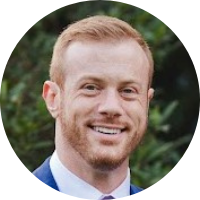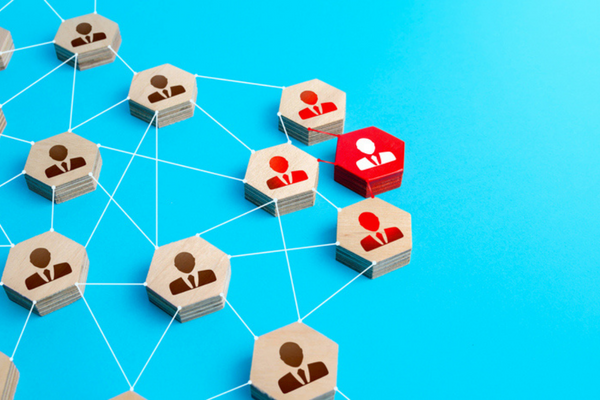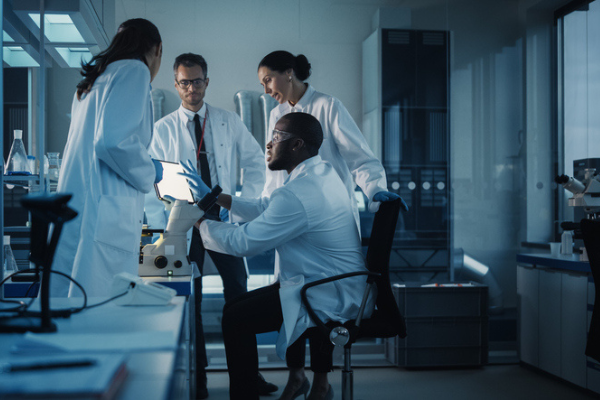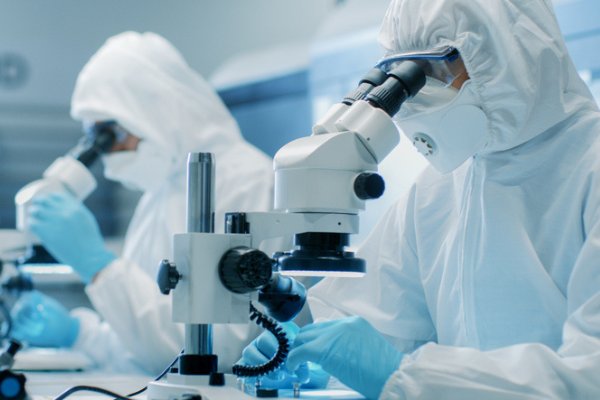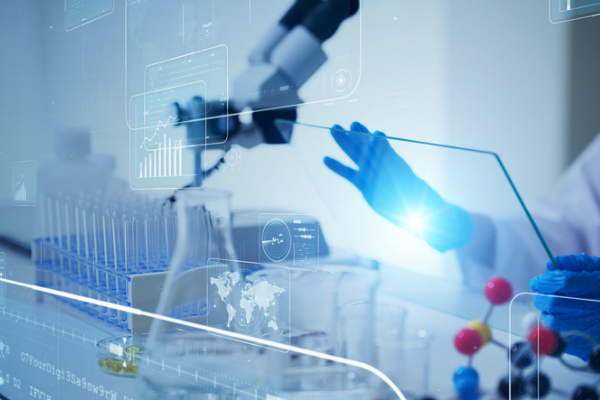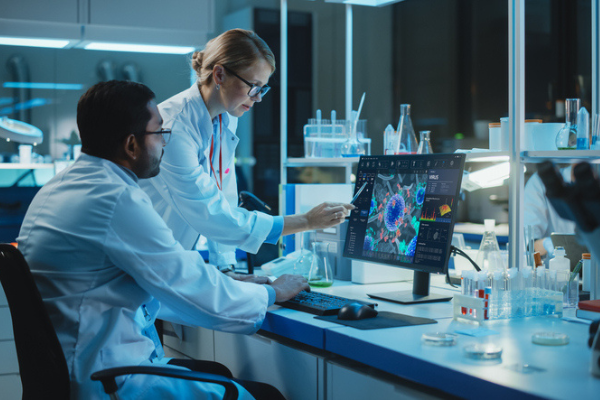
What motivated you to pursue your MS?
My interest in pursuing a graduate degree started while completing my senior year laboratory research course near the end of my undergraduate career at UW. Prior to entering that level and type of research environment, I had little idea what it was all about and a secondary degree wasn’t even a consideration.
By the time I graduated I knew that I wanted to be a researcher and do science in either academia or the chemical industry, but I didn’t feel quite prepared. You could say I was a late bloomer in this regard, only just discovering what I wanted to do as I received my BS degree. Continuing my education, growing as a scientist, and gaining additional research experience became my goals at that time. So, earning a MS degree in chemistry was the obvious next step for me, and DePaul was a perfect fit.
It’s been about 12 years since you completed your MS. As you look back, in what ways has that advanced degree benefitted you? Were there any thoughts of pursuing a PhD?
With a smaller chemistry department, DePaul offered what I consider a unique opportunity in academia to work much more closely with faculty, advisors, and students than I would be able to do at a larger college or university. I was able to join a research lab where I was, at times, the only graduate lab member. I became heavily involved in teaching within the department as well as in undergraduate chemistry course curriculum development, and I even stayed on after graduating as an adjunct to teaching and continue the research I started while a graduate student. In short, it allowed me to achieve what I had set out to, and then some, in terms of preparation for a career, growth as a scientist, and gaining experience.
This was all well and good, but one of the most beneficial takeaways was how working side-by-side with professors and faculty in the department had changed how I communicate. Before graduate school, I looked up to professors in awe as if they were these supernatural beings—rendered speechless and totally intimidated for no good reason—unable to effectively communicate with them. Working closely with my advisors and several faculty in a 1-on-1 capacity at DePaul completely changed that.
While there are other ways that earning a MS degree benefitted me, this was by far the most significant. It allowed me to break down my own personal communication barriers that I struggled with, especially when it came to communicating science. It’s still something I work on to this day, but without that experience and growth, I wouldn’t be nearly as capable as I am today. It has singlehandedly been the greatest contributor to my success.
As far as thoughts on pursuing a PhD…? It’s a funny thing you should ask, because not long after completing my MS I found myself in north Philadelphia doing just that at Temple University. The short version of this story is that life has a funny way of throwing you a curve ball at the most inopportune time, and after two years in the Chemistry PhD program at Temple, I had to leave and move to Boston, MA.
Fortunately for me, I was able to get a job as an entry level technician at the Dow Chemical Company at the Electronic Materials site in Marlborough, MA, and joined the Emerging Technologies group as entry level technician. Eight years later, and after going through a merger and spin-off with DuPont, I’m still there in the same group, now a scientist, and a part of the new DuPont. I haven’t seriously thought of going back to pursue a PhD since.
Describe your job as a chemical technical professional (CTP). What is your favorite part?
As a CPT, I’m a member of a highly multidisciplinary team of CPTs and scientists in the Emerging Technologies group. My broader responsibility is to develop, invent, and innovate new materials with my team for the DuPont Electronics and Industrial businesses and their customers.
On a much more granular level, I do everything from small molecule and polymer design and synthesis to material formulation and casting all the way to material characterization and analysis. One of my favorite parts of the job is the opportunity to collaborate within the company and learn new technologies from other R&D teams.
After working at Dow in a lead chemist role for about five years, you left for a similar position at DuPont in 2019. What were the motivations for the transition?
Dow merged with DuPont and in 2019, our site and my group spun off with the new DuPont.
You were a chief site safety laboratory stewardship leader. What did that role involve, and how did safety come to be a passion of yours?
As chief lab steward for the site, my role was to be the voice, eyes, and ears of the lab stewardship group at the table with our site leadership. It was my responsibility to present and discuss safety matters and findings voiced by the larger R&D community at regular leadership meetings, as well as to disseminate new policies and safety findings from the leaders to the greater lab stewardship and R&D groups. Within the lab stewardship group, the chief is responsible for leading various efforts such as the internal lab audit program, holding regular meetings with lab stewards across all R&D business units to maintain ongoing communication, and addressing safety topics raised by the broader R&D community, to name a few.
Safety has always been at the forefront of my mind going all the way back to when I was a high school chemistry student (thank you Ms. Gerlach). And, most importantly, as a chemist, I’m confronted on a daily basis with substances that if handled improperly can cause harm to me, those around me, the environment, and the community I’m a part of. It’s the most important thing and it must always be considered so that we can do what we do as responsibly as we can. For me, the goal is to reduce, if not eliminate, the total environmental impact of our work.
What is your best lab safety tip?
“Safety—first, last and always.” This is something I repeat to myself and anyone willing to listen to it going all the way back to my lab instructor days at DePaul.
More specifically, always make time to do an appropriate safety review before you run an experiment or process. One of the best practices I’ve been a part of is having, or being, a fresh pair of eyes to review and provide a thorough examination of what is being done and assess potential safety hazards. An outside perspective might reveal previously unforeseen risks and hazards, no matter how small. It’s always a great idea to ask a colleague to review what is planned and provide that additional safety check.
Think about early career chemical technical professionals. What can you share to help them advance in the workplace?
A big piece of advice I can share is this: listen and ask questions. Be a sponge. When starting out at Dow Electronic Materials, I knew nothing of the electronics industry. Yet, I was surrounded by experts and colleagues who knew everything about the electronics industry.
When starting out in a new position in an industry, many will find themselves in a similar situation. Learn as much as you can from as many people as you can. Build a network with people who know more than you do. The more you can learn and contribute through the experience you gain and the network of people you build, the easier it will be for you to take on new challenges and opportunities.
Remember to have fun with it, too. And try not to burn out. It goes without saying, but I’ll say it anyway, maintain a healthy work-life balance.
What are the characteristics of a high-performing supervisor of CTPs?
This is a good question, because to me, there are a couple that come to mind. The first characteristic I seek in a supervisor/manager/leader is that they provide me with opportunities for growth, especially as it expands my ability to positively impact projects. This is directly related to my level of exposure to the technologies our material R&D and products impact. For example: seminars, webinars, conferences, high-level project overviews, market reports, working on different projects, learning new technologies, etc. are all fair game to me.
The second characteristic is an extension of the first and that is that they listen to my career goals and provide me with the growth opportunities and a roadmap to achieve them. It feels great to have a leader invest in you and make you feel valued to that end.
How important is gaining new skills to achieving success as a CTP? Do you think it is better to be a self-learner, or are you a fan of taking additional classes/seminars to gain new skills?
In the electronics industry, developing new materials and products in one of the fastest changing and evolving markets on the planet keeps you on your toes. I must be willing to pivot and learn new techniques and skills to make what we do possible and successful in response to that market.
It goes without saying that this mindset would benefit anyone in any position in a technical industry. It is especially important for CTPs. If that requires being a self-learner or taking additional classes and seminars, then yes to all of the above. It will only benefit you. As a CPT, seeking out those opportunities to learn and gain additional skills both internally and externally is incredibly important. I’m encouraged to seek out these learning opportunities whether it’s a seminar, webinar, online course, or conference. The more I learn and the greater and more diverse my skillset becomes, the more capable and impactful I will be.
In a recent issue of ACS Industry Matters, Hamid Ghanadan wrote, “I believe that science suffers from a usability problem. People don’t know how to interact with and ‘use’ science in their daily lives.” What’s your reaction to that statement?
I completely agree. There is nuance and art in science that requires those who wish to use it to dig down into the fundamentals to fully understand it. What I see commonly overlooked, if not completely unstated, is that science is a process and that to use science, you must first understand the process. Experience is the best teacher, and it comes as no surprise that in order to understand science, people have to do science. That expectation and commitment could act as a barrier, as daunting as science might seem to the uninitiated, in attempting to understand it and the scientific method, let alone its application and use.
Hamid states, “It’s my belief that we should stop telling people about the science, and start inviting them to experience it,” and that I believe could breakdown that barrier by making science more accessible and dare I say more approachable. Personally, I’d like to see STEM education become a more central focus in elementary and grade school education curricula in K-12 programs. Additionally, science and research need to become more accessible in general for adults after receiving their education. Scientific journals and literature are largely kept behind a pay-per-use firewall and unless a person is a member of an academic institution, employee of a subscribing company, or if there is an inexhaustible source of money to purchase access to the literature, they don’t get to see examples of how science is actually published and communicated.
You have judged a few science fairs. What sticks out in your mind from those experiences?
How smart and intelligent young people are. I’ve been blown away by the ability and talent kids have for STEM. It’s incredibly inspiring—and also intimidating. Some of those kids are just awesome, and I hope that educational systems around the world are fostering and nurturing that raw talent.
What do you like to do with your time away from the workplace?
My wife and I enjoy winter sports so when the snow starts to fall in the winter, we head up north to the White and Green Mountains to ski, snowboard, and snowshoe. At home I enjoy setting up and maintaining freshwater and marine reef aquariums, and on a clear night I’ll take out my telescope to gaze at the stars and planets. Lastly, I can’t forget to mention all the walks my wife and I take with our dog Luna around our neighborhood and throughout Boston.
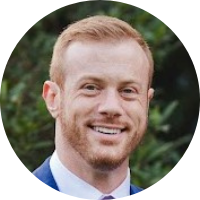
Charles Kinzie is a research and development scientist at DuPont in the Emerging Technologies group at the Shipley Campus in Marlborough, MA. He has been a key contributor in exploratory material development and design of new electronic materials earning several patents.
He has also been heavily involved in the research and development safety community as acting member of the Lab Stewardship Program since 2015. From 2018 to 2019, he was site leader for the Lab Stewardship Program and was awarded the Electronics and Industrial EH&S Award in 2019 for his safety contributions in that role and in advancing the program.
Currently, he is actively involved in mentoring CTPs and scientists across the DuPont Electronics and Industrial organization.
This article has been edited for length and clarity. The opinions expressed in this article are the author's own and do not necessarily reflect the view of their employer or the American Chemical Society.

